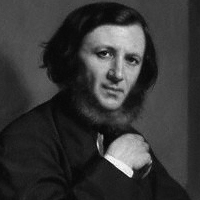Porphyria's Lover by Robert Browning: Summary and Analysis
Porphyria's Lover by Robert Browning was first published in 1836. It has been his ever short dramatic monologue which deals with the abnormal psychology of the lover. The lover strangles his beloved with her hair and describes the perfect happiness he finds through the killing of his beloved.

Robert Browning (1812-1889)
The lover is the speaker in this dramatic monologue. He lives in a cottage in a countryside. The particular night was stormy and the beloved takes shelter in her lover’s cottage. She makes fire in the fireplace and takes off her wet cloak and gloves. She talks to her lover, but he does not respond. She cuddles with him and tells the social difficulties she has to face to meet him. She says she loves him too much and the speaker realizes she worships him. He feels that the exact moment of her embracing is priceless. He wants her to remain same with him for ever and ever. He fears she might not love him in the same manner if it becomes difficult for her to face the societal dogma and hierarchy. To capture the perfect moment forever, the eccentric lover decides something strange and winds her golden hair three times around her neck and kills her. She even does not protest and utter a sound. He, then, talks to her dead body, opening her blue eyes, propping her body and calling her cheek ‘blushed’ and head ‘rosy little head’. Throughout the whole night he spent the time with her dead body and in the final line he shocked us stating that ‘And yet God has not said a word!’
In the surface reading, we are not explicitly told about the possessive murder. But the clues given suggest that the lover became jealous. He takes her as his only possession. He wants to win her love forever. He has the fear that she might be lost. He thinks he can stop the loving moment and capture the time by killing her. The murder is committed to win her forever.
The crime is one aspect of the poem. Another aspect is social attitude. The line "God has not said a word!" stands for social attitude. Entire Victorian culture was based on the male perspective. So, even God is a part of the repressive culture. This crime is sanctioned by the society. Nobody bothers to speak against this criminal activity. The final line may also register the persona's sense of guilt over his crime. Despite his elaborate justifications for his act, he has, in fact, committed murder, and he expects God to punish him or, at least, to take notice. The persona is surprised, perhaps a little uneasy, at God's continued silence. God, here, may be symbolically stands for the male dominated society where the murder of a lady is noticed, but no action is taken against it.
The setting of the poem is quite violent. The violent nature outside has been juxtaposed with the violence in a man. The form of poetry, the dramatic lyric is used to explore the violence, lying inside the human psyche. The speaker seems convinced that Porphyria wanted to be murdered, and claims ‘No pain felt she’ while being strangled, adding, as if to convince himself, ‘I am quite sure she felt no pain.’ He may even believe she enjoyed the pain, because he, her lover, inflicted it.
In Browning’s dramatic monologue, mostly, the speaker is psychologically disturbed or eccentrics. These speakers talk about the past incidents where they had committed a crime, but skillfully tried to hide their jealous feeling towards the dead one. But, however skillful they are to hide their sick psychology, they unknowingly reveal their crime and the reasons too. In this poem too, the speaker does not directly say that he is insecure in terms of her love, and to be sure and to possess her, he kills her. It is his indirect expressions and the ways he handles the dead body of his beloved that reveals his disorder psychology and his mad mentality.
Some of the critics are of the view that the lover might be impotent to satisfy the sexual urge of Porphyria. They support their view with the textual references: he calls himself ‘one so pale / for love of her, and all in vain.’ When the lady enters in the room, the lover does not feel excited. He passively sits and never speaks a word to her. When she embraces him, he does not respond and no feeling of physical intimacy comes in him. Instead, he suddenly strangles her with her golden hair with the feeling of defeat. He feels incapable of satisfying her sexual need even in such a romantic background. So, not to face his own defeated self, he kills her. The rhyming pattern of the poem is ABABB. The concentration and the irregularity of the pattern suggest the hidden madness of the speaker.
Related Topics
 |
bachelorandmaster.com |